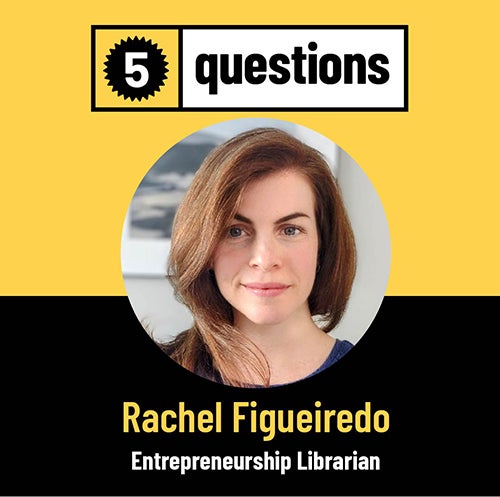
Once a month the Student Engagement and Communications Assistant co-op student interviews Library staff to provide patrons with a peek behind the bookstacks at all the work that happens to provide a variety of services and resources that support the learning, research and innovation that happens at Waterloo.
This month, co-op student Mia Malidzanovic interviewed Rachel Figueiredo, the Entrepreneurship Librarian.
Q1: How does your position benefit the Library community?
Being the entrepreneurship librarian at Waterloo is an interesting role because it isn’t a job that supports a particular department. There is the Conrad School of Entrepreneurship and Business, which I help support, but I also support many co-curricular groups across campus, including Velocity, GreenHouse, as well as a lot of student-run groups. There are a lot of these “plus business” programs that happen around campus. I get the benefit of working with students and faculty from across campus and many different programs.
Waterloo has such a big reputation for entrepreneurship, innovation and startup culture, so it's been interesting to be a part of that and see how we can bridge between startup culture and Library culture. We're really focused on research and thinking through your ideas, looking at past problems and trying to see who else has solved them. Why haven't their solutions worked? What can you try differently? The Library brings a research angle to startup culture so that people who are working in that space feel more informed and can make better decisions.
Q2: What is one Library service or resource that Library users should know about?
We have access to this database called Statista, and it is so cool. People from any department can make use of it. It’s a statistics portal, which means if you have a question, you can use it like a search engine. For example, if you want to know which country drinks the most coffee, or you want to get a sense for the user base of a particular company, you can do that through this tool. It has many different applications, but it's also really approachable. I refer to this statistics portal as the next step beyond Google. If you're comfortable searching in Google, you're going to be comfortable searching in Statista.
Q3: What other faculties or departments do you work with on campus?
As the entrepreneurship librarian, I work with a lot of different programs, some curricular and some co-curricular. Lately I’ve been doing a lot of work with our “plus business” programs, such as environment and business or science and business. We have a librarian who supports each of the subject areas studied on campus, but others, like myself, support some of these offshoot programs. For example, I help in supporting management sciences, which gives me a little bit more integration into engineering and all the work that those students are doing, which is typically capstone projects.
Q4: Where do you see the future of the Library?
The comment that I hear most often is, “I wish I knew this before.” I am often in a class teaching students in their 4th year, or at the graduate level or doing their engineering capstone projects. They become interested in doing research through the Library and it’s only right before they graduate that these students start thinking of research tools, databases (like Statista) and using this information that we can only grant access to current Waterloo users. As a librarian this is so frustrating because you just want to be able to teach them more.
I hope the Library's future is getting integrated at an earlier stage for many students and having them think about the Library as a research partner earlier in their academic careers. I can also see this on a faculty or researcher side as well, where I think in the past the Library has sometimes been a place to think about where you go to read literature from your subject area, instead of thinking about a subject librarian as a person you would contact at the outset of your research. I am hopeful that this is changing for a lot of researchers and that the Library will continue to become a leading partner alongside students and faculty in their research.
Q5: What is your favorite book?
I was thinking about this question from two perspectives because I have a bunch of books that were really pivotal at particular moments in my life, but I think I will focus on the two books that I've read in recent years. Untamed by Glennon Doyle and Burnout: The Secret to Unlocking the Stress Cycle by Emily and Amelia Nagoski. These feel like required reading for every woman I know to help rethink the ways that we are doing our jobs, talking to ourselves, participating in our communities and families. Overall, they serve as great reminders to be gentler with ourselves. They have been very helpful books to think through in this phase of my life, and I hope they're helpful for other people too.
If you enjoyed reading about Rachel’s role at the Library, read our previous interviews with Melanie Hannaford Library Administrative Officer, Israel Cefrin da Silva, Library Information Technology Specialist/Developer, librarian Marian Davies, university librarian Beth Namachchivaya, and library coordinator at Musagetes Mark Anderton.